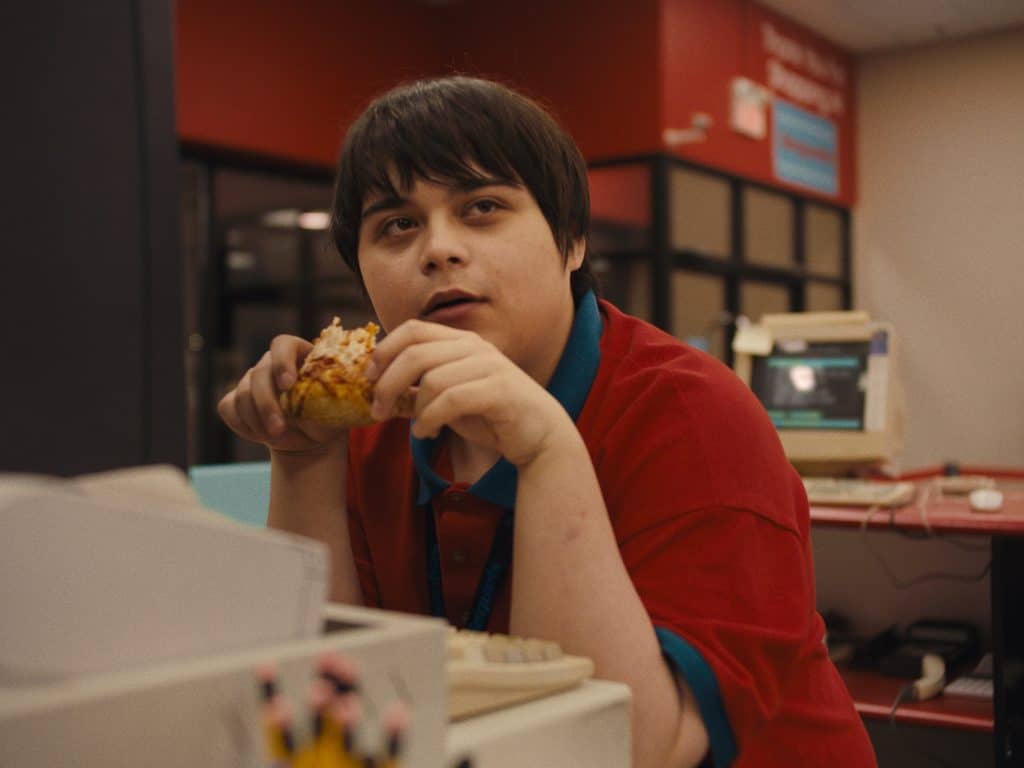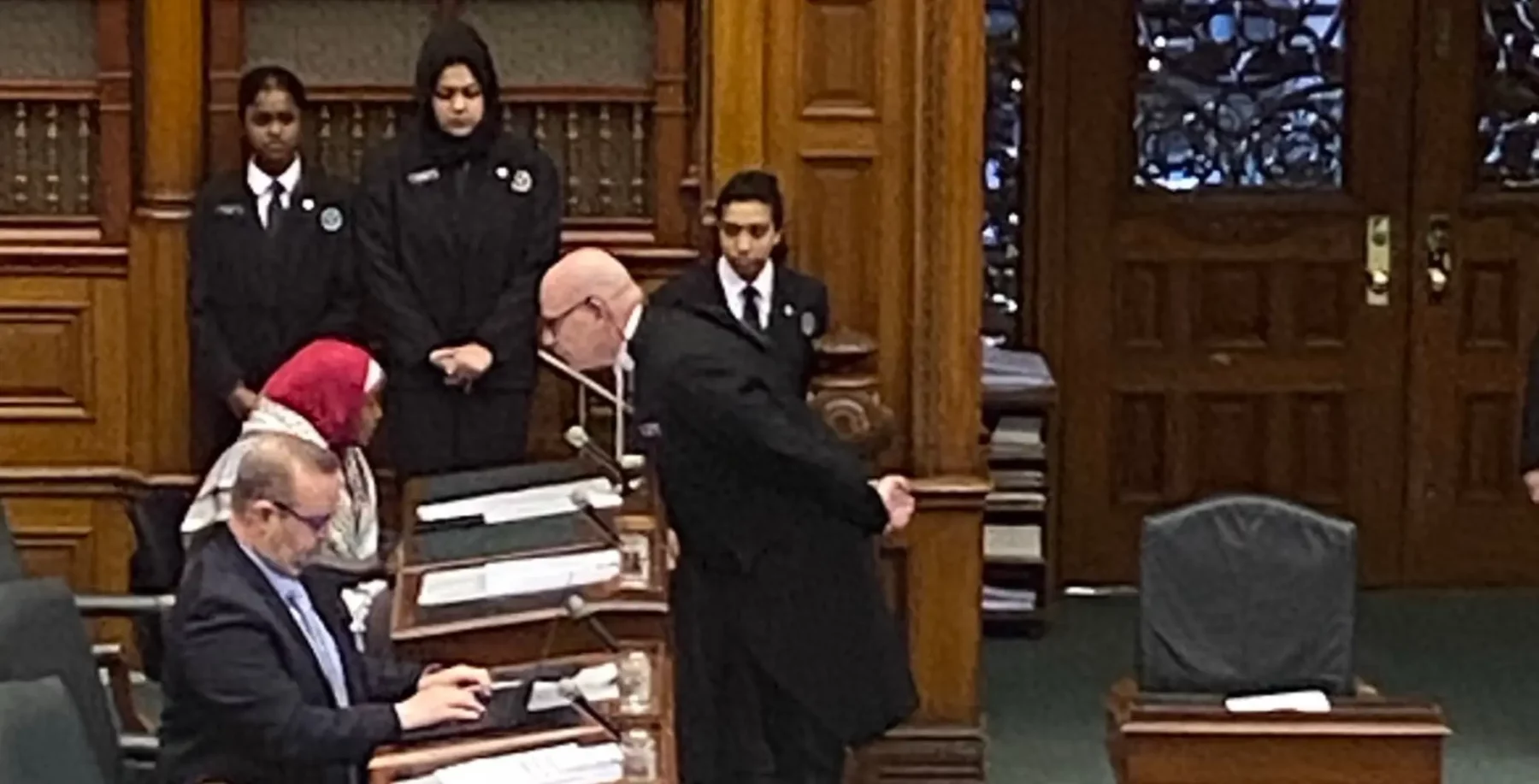

Chandler Levack derails the film-bro-to-incel pipeline in I Like Movies.
Her debut feature, which is premiering at TIFF, is a smart and sweet coming-of-age dramedy about a young dork working at a video rental store who is almost violently protective of his movie tastes.
Made through Telefilm’s Talent To Watch program, the film is inspired by Levack’s own experience working at a Burlington Blockbuster during her last year of high school. “That was one of the loneliest periods of my life,” she tells NOW on a Zoom call from her dad’s home in Burlington. “I was basically working all the time and waiting for high school to really be over, but at the same time not really appreciating my friends, people around me or even where I was from. I was just so focused on getting out of there while completely in love with movies, music and popular culture – really defining myself just by my taste.”
Levack – a former NOW intern turned film, music and culture writer and filmmaker – spoke to us about projecting her own experience onto a male character who exhibits film bro traits and giving the male-dominated workplace comedy genre a tender and incisive female perspective.
Listen to the whole conversation on the NOW What podcast Apple Podcasts, Spotify or the player below, or read the edited and condensed version further down.
Rad: I saw the development of this movie on Facebook, the casting and stuff. My initial preconception was: I got this movie’s number. “Chandler is making this nostalgic movie of working in a video store. There’s going to be a twee vibe. I know what she’s going for.” I watch the movie (this morning) and it’s not like the premise isn’t what I expected, but fuck – it blew me away.
Levack: Oh, thank god.
It blew me away because it was genuinely really funny. It was really moving. I felt myself tearing up in certain moments. And the big surprise to me is you made me empathize with people I thought I would never, ever empathize with.
Levack: First of all, you’re the first critic I showed the movie to. I’m still processing the fact that it exists in the world now. It’s been a crazy week. The announcement for TIFF was on Thursday. And I feel like since then, this movie isn’t just a thing that belongs to me, my editor and producers. It’s actually going into the world. It’s like a child that’s been in my womb for a really long time. I just pushed it out and now people are going to be like, “your child’s ugly” and “your child’s a lot cooler than I thought your child was going to be.”
Part of the reason why I had these preconceptions, when you decided to make a movie set around 2000 in a video store, my immediate touchstone was Kevin Smith.
Levack: Like, “Okay this is like Wes Anderson… Clerks… great.”
That’s the thing. For me Kevin Smith is like… he’s like the shit-end of the stick of Linklater and Tarantino. So that fed my expectations. But there is also a High Fidelity vibe here. Because it’s not Clerks. It’s way more genuine than something like Clerks.
Levack: Yeah. Adventureland was kind of a touchstone for me. It’s interesting because I came of age watching all those movies in the back room at Blockbuster and having to read myself into the main characters, because there was no female films that were made like this.
As a filmmaker and a critic, I’ve really immersed myself in the world of film bros and music bros, really tried to see the world through their eyes and try to love the art that they loved and understand why they loved it.
At the worst, those guys can be really insidious, mean and snobs. They use their love of film and popular culture as a way to not engage with people. I was like, “What were those guys like in high school? Is there a way that maybe you could set them on a path of healing early in life where they can start to identify women and other people in their lives as human beings and really learn how to connect and engage with people before it’s too late?” That was the intention of my film: to deconstruct that cultural trope at the most pivotal formation of their ego and identity and set them on a course of healing.
So you went after the primal moment of film bro toxic culture.
Levack: Although there’s way more of me in the movie. I’m a lot more like Lawrence than I would care to admit.

Let’s talk about this gender flip thing. You’re tackling your last year of high school. But you made the character a dude. You’re saying you grew up in that environment. You were a part of that environment. You identified with them a lot more than maybe you would want to admit. Would you say that there’s an internalized misogyny? Is that something you had to deconstruct when writing this?
Levack: I became a journalist/cultural critic really early in my life. When I was 18, I was already interning at NOW Magazine and writing articles for the school newspaper. By the time I was 19… 20, I did an internship at Spin Magazine in New York and became a professional music critic. I dropped out of university. I worked at Eye Weekly. I defected to the other alt-weekly.
As a very young woman, all my mentors were strictly men in their 30s/40s. I felt like I was learning about culture through the stuff that they liked. I think it’s the same with filmmaking and the male auteurs that I revered when I was young. You hit a certain age where you start wondering what would my life and cultural tastes be like if I had been only strictly watching, like, Agnes Varda movies and had been mentored by women and reading more female authors and stuff.
When I was applying to the Telefilm Talent To Watch program, this filmmaker read my application and gave me some advice. She was like, “Why isn’t your main character a woman? It’d be so much easier for you to get funding. Why do you even want to make a film about a young man? Haven’t we seen enough young men on screen?” Which is a valid question. But I was like.. it’s so interesting that women are being told we can only write female characters if we want to tell a story as a female filmmaker. There’s a really interesting gap in representation: Films about young men that are made by women, where it’s women seeing men maybe from a different angle than they themselves.
I think that’s the real muscle of your movie: The way you can break him down, the way you have his number, the way you see how the world sees him and how the female character Alana sees him; the empathy you have for this character. Like I said, you gave me a character that I never thought I’d be empathetic for.
You also obviously have a lot of sensitivity to what Alana (a manager at the video store) experiences in Lawrence’s orbit. So having your perspective on this Lawrence character, that’s what was so incredible, just seeing him from your eyes. For me, I look at this guy like he’s the makings of an incel.
Levack: I remember my lead actor Isaiah Lehtinen telling me this movie was Ladybird for incels.
Yes!
Levack: But in a good way.
But only because you decided to give him a redemptive arc. When you first meet the character, he reminds me of so many entitled white boys who feel like they’re just too good for a regular job that everyone else as has. Talk to me about listing off all the entitlement and the narcissism and analyzing how dangerous and misogynistic that that can be.
Levack: So much of the movie is just everybody ceding space to him, even when he doesn’t deserve it. I wanted to give him a really dark back story, but then also use that as a way to [say] you can have extreme trauma happen to you but you can still be a jerk. I’ve been living with this character since 2018.
So you forgot what it’s like to not like him.
Chandler: I think I feel really mixed emotions about him. I really care about him and I want to protect him and stuff. But then, sometimes I would just be like, “Oh my god, shut up.”
And then, when we cast [Lehtinen], he brings so much nuance and charisma to the role and a very deep well of tenderness. But also, he is a real force of nature in that part. Sometimes there would be these scenes where he’d just be screaming and exploding at somebody. It made me feel uncomfortable. I think [Lawrence] is just someone who doesn’t really know how to calibrate their emotions or even knows that they have real emotions yet. They’re just really scared of feeling anything.

I’m stuck on Lady Bird for Incels. That’s a great tagline. Where did you find this kid?
Levack: He’s from Vancouver. We did a whole Canada-wide casting search, which was led by my incredible casting director, Jesse Griffiths, who’s amazing. Over 300 actors submitted self-tapes. And it is such a specific part that a lot of young boys that want to be professional actors just didn’t relate. They were all way too unthreatening. They didn’t have the same kind of life experience that Lawrence has. And they didn’t understand any of the references or even like movies that much.
And then Isaiah was one of the last people to audition. And in his audition he was wearing a shirt for that Robert Pattinson movie The Lighthouse. And his audition, he played it super sincere, straightforward to the camera, really quiet. I was like, “This isn’t anything that I imagined the character to be, but it’s so much richer and more fascinating and interesting.” And then we met over Zoom. He was like, my acting heroes are Danny DeVito and Philip Seymour Hoffman. And I was like, “Whoa. That’s so cool.” I think everyone else wanted to be like Chris Pine, Chris Evans or something.
We just immediately bonded. This person really speaks my language. So many of the movie’s best adlibs are entirely Isaiah. He’s just amazing.
This is the second actor you cast out of Vancouver that I’m aware of. (The first was Finn Wolfhard, who got his start in a PUP music video co-directed by Levack, which he used for his Stranger Things audition).
So let’s talk about the other side of this. The emotional elements here don’t work without casting Alana and the mother. They’re both incredible.
Levack: Lawrence really comes of age through his relationship with women, especially with Alana. In a lot of ways, they’re kind of mirror images of each other.
Romina D’Ugo’s audition was so specific and incredible. She actually comes from a dance background. Her flair for physical comedy, all the ways that she uses her body, was just amazing to me as a director.
I just wanted to really flesh out a character where she’s not just a love interest, a muse or some empty vessel for his coming of age. I think in another movie like this, Lawrence and Alana would kiss in the back room of the video store.
I’m thinking of Emma Stone at the ending of Superbad. After Jonah Hill has been this type of character, the fantasy comes true for him.
Levack: Yeah, like a fantasy object. I just wanted there to be a lot there, and for her to deconstruct that trope by [saying], “Hey, you’re a narcissist. You’re actually like a bad person. And weirdly, I’ve given you so much power. And I don’t understand why I’m doing that. Maybe it’s because of my repressed trauma about guys like you.”
Read more:
Brother brings Scarborough to the world












